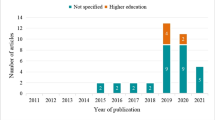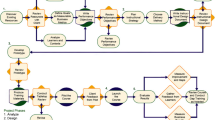Abstract
Online learning has grown in popularity, leading to more widespread utilization of online exams. Online exams have started to become a preferred method of assessment in both online and traditional learning environments. They provide various benefits for the learning process and learners when used appropriately within online learning programs. The current study aims to investigate the academic achievement of online learners in online exams as compared to traditional exams and to analyze their perceptions towards online exams. The study was conducted at a state university in Turkey during the 2018 spring semester. Participants of the study are 163 vocational college level online learners. This research has been designed as a mixed method study. In this regard, learners’ academic achievement and perceptions have been considered as quantitative data and learners’ opinions as qualitative data. Through the use of quantitative analysis methods, it is shown that learners report positive attitudes towards online exams and that there was no statistically significant difference in the students’ academic achievement in online and traditional exams. The majority of the learners pointed out that online exams are efficient, usable, and reliable while others indicated a level of insufficiency related to exam duration, as well as concerns about potential technical problems that may occur during the implementation of online exams. Understanding the benefits and challenges of online exams will help the institutions in planning their institutional road map.
Similar content being viewed by others
References
Adnan, I. (2016). Online assessment at Universitas Terbuka (Indonesia Open University). ICERI2016 Proceedings, 4928–4936.
Al-Mashaqbeh, I. F., & Al Hamad, A. (2010). Student’s perception of an online exam within the Decision Support System Course at Al al-Bayt University. In Proceedings Second International Conference on Computer Research and Development, ICCRD 2010 (pp. 131–135). IEEE. doi: https://doi.org/10.1109/ICCRD.2010.15
Al-Shalabi, E. (2016). An automated system for essay scoring of online exams in Arabic based on stemming techniques and levenshtein edit operations. International Journal of Computer Science Issues, 13, 45–50.
Alsadoon, H. (2017). Students’ perceptions of e-Assessment at Saudi Electronic University. Turkish Online Journal of Educational Technology-TOJET, 16(1), 147–153.
Ardid, M., Gómez-Tejedor, J. A., Meseguer-Dueñas, J. M., Riera, J., & Vidaurre, A. (2015). Online exams for blended assessment. Study of different application methodologies. Computers & Education, 81, 296–303. https://doi.org/10.1016/j.compedu.2014.10.010.
Atoum, Y., Chen, L., Liu, A. X., Hsu, S. D., & Liu, X. (2017). Automated online exam proctoring. IEEE Transactions on Multimedia, 19(7), 1609–1624.
Bandele, S. O., Oluwatayo, J. A., & Omodara, M. F. (2015). Opinions of undergraduates on the use of electronic examination in a Nigerian University. Mediterranean Journal of Social Sciences, 6(2 S1), 75. https://doi.org/10.5901/mjss.2015.v6n2s1p75.
Bayazit, A., & Askar, P. (2012). Performance and duration differences between online and paper-pencil tests. Asia Pacific Educational Review, 13(2), 219–226. https://doi.org/10.1007/s12564-011-9190-9.
Boevé, A. J., Meijer, R. R., Albers, C. J., Beetsma, Y., & Bosker, R. J. (2015). Introducing computer-based testing in high-stakes exams in Higher Education: Results of a field experiment. PLoS One, 10(12), e0143616. https://doi.org/10.1371/journal.pone.0143616.
Böhmer, C., Feldmann, N., & Ibsen, M. (2018). E-exams in engineering education — online testing of engineering competencies: Experiences and lessons learned. Paper presented at the 2018 IEEE Global Engineering Education Conference (EDUCON). doi: https://doi.org/10.1109/EDUCON.2018.8363281
Cabı, E. (2016). The perception of students on E-Assessment in Distance Education. Journal of Higher Education & Science [Yükseköğretim ve Bilim Dergisi], 6(1), 94–101. https://doi.org/10.5961/jhes.2016.146.
Chu, R. J. (2010). How family support and Internet self-efficacy influence the effects of e-learning among higher aged adults – Analyses of gender and age differences. Computers & Education, 55(1), 255–264. https://doi.org/10.1016/j.compedu.2010.01.011.
Comber, C., Colley, A., Hargreaves, D. J., & Dorn, L. (1997). The effects of age, gender and computer experience upon computer attitudes. Educational Research, 39(2), 123–133. https://doi.org/10.1080/0013188970390201.
Conrad, D., & Openo, J. (2018). Assessment Strategies for Online Learning: Engagement and Authenticity. AU Press: Athabasca University. doi:https://doi.org/10.15215/aupress/9781771992329.01
Ćukušić, M., Garača, Ž., & Jadrić, M. (2014). Online self-assessment and students’ success in higher education institutions. Computers & Education, 72, 100–109. https://doi.org/10.1016/j.compedu.2013.10.018.
Dermo, J. (2009). e-Assessment and the student learning experience: A survey of student perceptions of e-assessment. British Journal of Educational Technology, 40(2), 203–214. https://doi.org/10.1111/j.1467-8535.2008.00915.x.
Dong, J. Q., & Zhang, X. (2011). Gender differences in adoption of information systems: New findings from China. Computers in Human Behavior, 27(1), 384–390. https://doi.org/10.1016/j.chb.2010.08.017.
D'Souza, K. A., & Siegfeldt, D. V. (2017). A Conceptual Framework for Detecting Cheating in Online and Take-Home Exams. Decision Sciences Journal of Innovative Education, 15(4), 370–391. https://doi.org/10.1111/dsji.12140.
Farrús, M., & Costa-Jussà, M. R. (2013). Automatic evaluation for e-learning using latent semantic analysis: A use case. The International Review of Research in Open and Distributed Learning, 14(1), 239–254. https://doi.org/10.19173/irrodl.v14i1.1389.
Gvozdenko, E., & Chambers, D. (2007). Beyond test accuracy: Benefits of measuring response time in computerised testing. Australasian Journal of Educational Technology, 23(4), 542–558.
Hillier, M. (2014). The very idea of e-Exams: student (pre) conceptions. In B. Hegarty, J. McDonald, & S.-K. Lok (Eds.), Rhetoric and Reality: Critical perspectives on educational technology. Proceedings Ascilite, Dunedin 2014 (pp. 77–88). Ascilite.
Jawaid, M., Moosa, F. A., Jaleel, F., & Ashraf, J. (2014). Computer based assessment (CBA): Perception of residents at Dow University of Health Sciences. Pakistan Journal of Medical Sciences, 30(4), 688–691. https://doi.org/10.12669/pjms.304.5444.
Johnson, B. C., & Kiviniemi, M. T. (2009). The effect of online chapter quizzes on exam performance in an undergraduate social psychology course. Teaching of Psychology, 36(1), 33–37. https://doi.org/10.1080/00986280802528972.
Johnson, G. (2006). Optional online quizzes: College student use and relationship to achievement. Canadian Journal of Learning and Technology [La revue canadienne de l’apprentissage et de la technologie], 32(1). https://doi.org/10.21432/T2J300.
Jr, G. R. C., Ehlen, C. R., & Raiborn, M. H. (2011). Thwarting online exam cheating without proctor supervision. Journal of Academic and Business Ethics., 4, 1–7.
Karay, Y., Schauber, S. K., Stosch, C., & Schüttpelz-Brauns, K. (2015). Computer versus paper—Does it make any difference in test performance? Teaching and Learning in Medicine, 27(1), 57–62. https://doi.org/10.1080/10401334.2014.979175.
Kemp, N., & Grieve, R. (2014). Face-to-face or face-to-screen? Undergraduates’ opinions and test performance in classroom vs. online learning. Frontiers in Psychology, 5, 1278. https://doi.org/10.3389/fpsyg.2014.01278.
Kesici, S., Sahin, I., & Akturk, A. O. (2009). Analysis of cognitive learning strategies and computer attitudes, according to college students’ gender and locus of control. Computers in Human Behavior, 25(2), 529–534. https://doi.org/10.1016/j.chb.2008.11.004.
Krippendorff, K. (2004). Content analysis: An introduction to its methodology (2nd ed.). Sage Publications.
Laine, K., Sipilä, E., Anderson, M., & Sydänheimo, L. (2016). Electronic exam in electronics studies. Paper presented at the SEFI Annual Conference 2016: Engineering Education on Top of the World: Industry University Cooperation. Tampere, Finland.
Mellar, H., Peytcheva-Forsyth, R., Kocdar, S., Karadeniz, A., & Yovkova, B. (2018). Addressing cheating in e-assessment using student authentication and authorship checking systems: teachers’ perspectives. International Journal for Educational Integrity, 14(1), 2. https://doi.org/10.1007/s40979-018-0025-x.
Nguyen, Q., Rienties, B., Toetenel, L., Ferguson, R., & Whitelock, D. (2017). Examining the designs of computer-based assessment and its impact on student engagement, satisfaction, and pass rates. Computers in Human Behavior, 76, 703–714. https://doi.org/10.1016/j.chb.2017.03.028.
Orr, R., & Foster, S. (2013). Increasing student success using online quizzing in introductory (majors) biology. CBE—Life Sciences Education, 12(3), 509–514. https://doi.org/10.1187/cbe.12-10-0183.
Ozden, M. Y., Erturk, I., & Sanlı, R. (2004). Students’ perceptions about online assessment: A case study. Journal of Distance Education, 19(2), 77–92.
Parshall, C. G., Spray, J. A., Kalohn, J. C., & Davey, T. (2002). Practical considerations in computer-based testing. New York: Springer.
Rovai, A. P. (2000). Online and traditional assessments: what is the difference? The Internet and Higher Education, 3(3), 141–151. https://doi.org/10.1016/S1096-7516(01)00028-8.
Smith, B., & Caputi, P. (2007). Cognitive interference model of computer anxiety: Implications for computer-based assessment. Computers in Human Behavior, 23(3), 1481–1498. https://doi.org/10.1016/j.chb.2005.07.001.
Sorensen, E. (2013). Implementation and student perceptions of e-assessment in a Chemical Engineering module. European Journal of Engineering Education, 38(2), 172–185. https://doi.org/10.1080/03043797.2012.760533.
Strauss, A., & Corbin, J. (1990). Basics of qualitative research: Grounded theory procedures and techniques. Newbury Park: Sage Publications.
Terzis, V., & Economides, A. A. (2011). Computer based assessment: Gender differences in perceptions and acceptance. Computers in Human Behaviour, 27(6), 2018–2122. https://doi.org/10.1016/j.chb.2011.06.005.
Wang, Y., Wu, M., & Wang, H. (2009). Investigating the determinants and age and gender differences in the acceptance of mobile learning. British Journal of Educational Technology, 40, 92–118. https://doi.org/10.1111/j.1467-8535.2007.00809.x.
Werhner, M. J. (2010). A comparison of the performance of online versus traditional on-campus earth science students on identical exams. Journal of Geoscience Education, 58(5), 310–312.
Yılmaz, Ö. (2016). Çevrimiçi Sınav Görüş Anketi. e-Kafkas Eğitim Araştırmaları Dergisi, 3(3), 26–33.
Acknowledgements
We want to thank to Instructor Mesut Sevindik, who helped us during data collection process.
Author information
Authors and Affiliations
Corresponding author
Additional information
Publisher’s note
Springer Nature remains neutral with regard to jurisdictional claims in published maps and institutional affiliations.
Rights and permissions
About this article
Cite this article
Ilgaz, H., Afacan Adanır, G. Providing online exams for online learners: Does it really matter for them?. Educ Inf Technol 25, 1255–1269 (2020). https://doi.org/10.1007/s10639-019-10020-6
Received:
Accepted:
Published:
Issue Date:
DOI: https://doi.org/10.1007/s10639-019-10020-6




